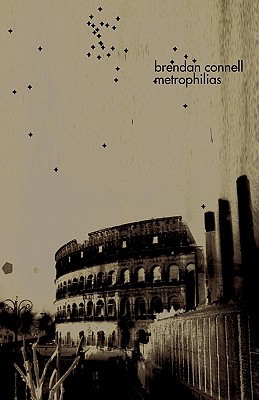By BRENDAN CONNELL (Better Non Sequitur; 2010)
A subtly deranged, obliquely beautiful oddity. The thirty six stories in this short and pointed compendium of urban neurosis span the globe and the centuries, with each set in and named after a different city. The contents are extremely minimal in tone and style (few last more than two or three pages) yet all have a lasting poetic resonance.
Nearly every perversion you can think of, from bald head and high heel fetishism to necrophilia to statue prostitution(!), is explored herein, as well as none-too-pleasant subjects like self mutilation and pyromania, yet the overriding tone is one of wistful romanticism. Most every story involves a lovesick someone, with that love, combined with the pressures of city life, more often than not driving that character to insanity—if he/she isn’t there already. “But,” as one story cautions, “it is easy to call a man in love a madman.”
METROPHILIAS’ stories, while fairly varied, are very much of a piece, meaning there’s little point in picking out favorites. Particularly representative entries include “Kiev,” which contains the line quoted above, being the twisted tale a man in love with a woman’s severed head; “Edinburgh,” concerning a civil servant driven to suicide by his all-consuming infatuation with the letter W (“Those two overturned mounds, so eloquently resembling the dangling breasts of a woman—or then again, like legs flung in the air”); “Peking,” wherein a prince grows obsessed with a ceramic vase that becomes his undoing; “Seville,” whose protagonist is a swordsman who finds bliss by running himself through with his beloved sword; and “Thebes,” about an ancient Egyptian king whose ideal mate is a woman whose nose is “enormous, bulbous, deliciously ampliform, so large indeed that it hid the rest of her face…”
Brendan Connell must be counted as one of the most unique and talented purveyors of horror/fantasy/unclassifiable fiction currently at work. While his fertile and expressive prose can become downright Byzantine on occasion (as in the noggin-scratching “Havana”), there’s little doubt that, based on METROPHILIAS, this writer is in a class—and category—of his own.

